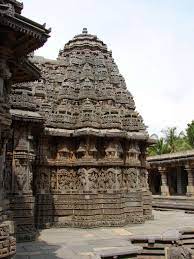CURRENT AFFAIRS
Get the most updated and recent current affair content on Padhaikaro.com
India’s Nomination for World Heritage List for 2022-2023
- Vaid's ICS, Lucknow
- 03, Feb 2022

Why in News?
- Hoysala temples of Belur, Halebid and Somnathapura in Karnataka have been finalised as India’s nomination for consideration as World Heritage sites for the year 2022-2023.
- All three Hoysala temples are protected monuments of the Archaeological Survey of India.
- Earlier, the UNESCO’s World Heritage Centre (WHC) had agreed to publish Hindi descriptions of India’s UNESCO World Heritage Sites on the WHC website.
Key Points :
- The ‘Sacred Ensembles of the Hoysala’ are on the UNESCO’s Tentative list since 15th April 2014”.
- If the Hoysala temples attain this status, these monuments will be fourth on the state’s list of World Heritage Sites.
- The other three include the Hampi Monuments of Vijayanagara, Pattadakallu Temples complex of the Chalukyan era and the Western Ghats.
About Hoysala Temples :
- They are sometimes called hybrid or vesara as their unique style seems neither completely Dravida nor nagara, but somewhere in between.
- The Hoysala temples have a basic Darvidian morphology but show strong influences of the Bhumija mode widely used in Central India, the Nagara traditions of northern and western India, and the Karntata Dravida modes favoured by the Kalyani Chalukyas
What is the World Heritage List?
- A World Heritage site is classified as a natural or man-made area or a structure that is of international importance, and a space that requires special protection.
- These sites are officially recognised by the UN and the United Nations Educational Scientific and Cultural Organisation, also known as UNESCO.
- UNESCO believes that the sites classified as World Heritage are important for humanity, and they hold cultural and physical significance.
Selection criteria to be included on the World Heritage List
- To be included on the World Heritage List, sites must be of outstanding universal value and meet at least one out of ten selection criteria.
Selection criteria:
- To represent a masterpiece of human creative genius;
- To exhibit an important interchange of human values, over a span of time or within a cultural area of the world, on developments in architecture or technology, monumental arts, town-planning or landscape design;
- To bear a unique or at least exceptional testimony to a cultural tradition or to a civilization which is living or which has disappeared;
- To be an outstanding example of a type of building, architectural or technological ensemble or landscape which illustrates (a) significant stage(s) in human history;
- To be an outstanding example of a traditional human settlement, land-use, or sea-use which is representative of a culture (or cultures), or human interaction with the environment especially when it has become vulnerable under the impact of irreversible change;
- To be directly or tangibly associated with events or living traditions, with ideas, or with beliefs, with artistic and literary works of outstanding universal significance. (The Committee considers that this criterion should preferably be used in conjunction with other criteria);
United Nations Educational, Scientific and Cultural Organization (UNESCO)
- UNESCO was formed in 1945, is a specialized agency of the United Nations (UN) based in Paris.
- It works for achieving peace and security by promoting international collaboration through educational, scientific, and cultural reforms in order to increase universal respect for justice, the rule of law, and human rights along with fundamental freedom proclaimed in the United Nations Charter.
- It has 195 member states and ten associate members. India is a founding member of the Organisation.
Facts for Prelims :
PM- DevINE:
PM-DevINE
- It will be implemented through the North-Eastern Council.
- North-Eastern Council (NEC) is the statutory body established after amending the North-Eastern Council Act, 1971 in the year 2002. It is the nodal agency for economic and social development of 8 North Eastern Region States.
- The Home Minister is the ex-officio chairperson of the Council. The DoNER Minister is the Vice-Chairman. The council has Governors and Chief Ministers of all eight northeastern states as its members.
- An initial allocation of Rs. 1,500 crore will be made for the new scheme.
- It will fund infrastructure, in the spirit of PM GatiShakti, and social development projects based on the felt needs of the North-East.
- This will enable livelihood activities for youth and women, filling the gaps in various sectors.
- However, it will not be a substitute for existing central or state Schemes.